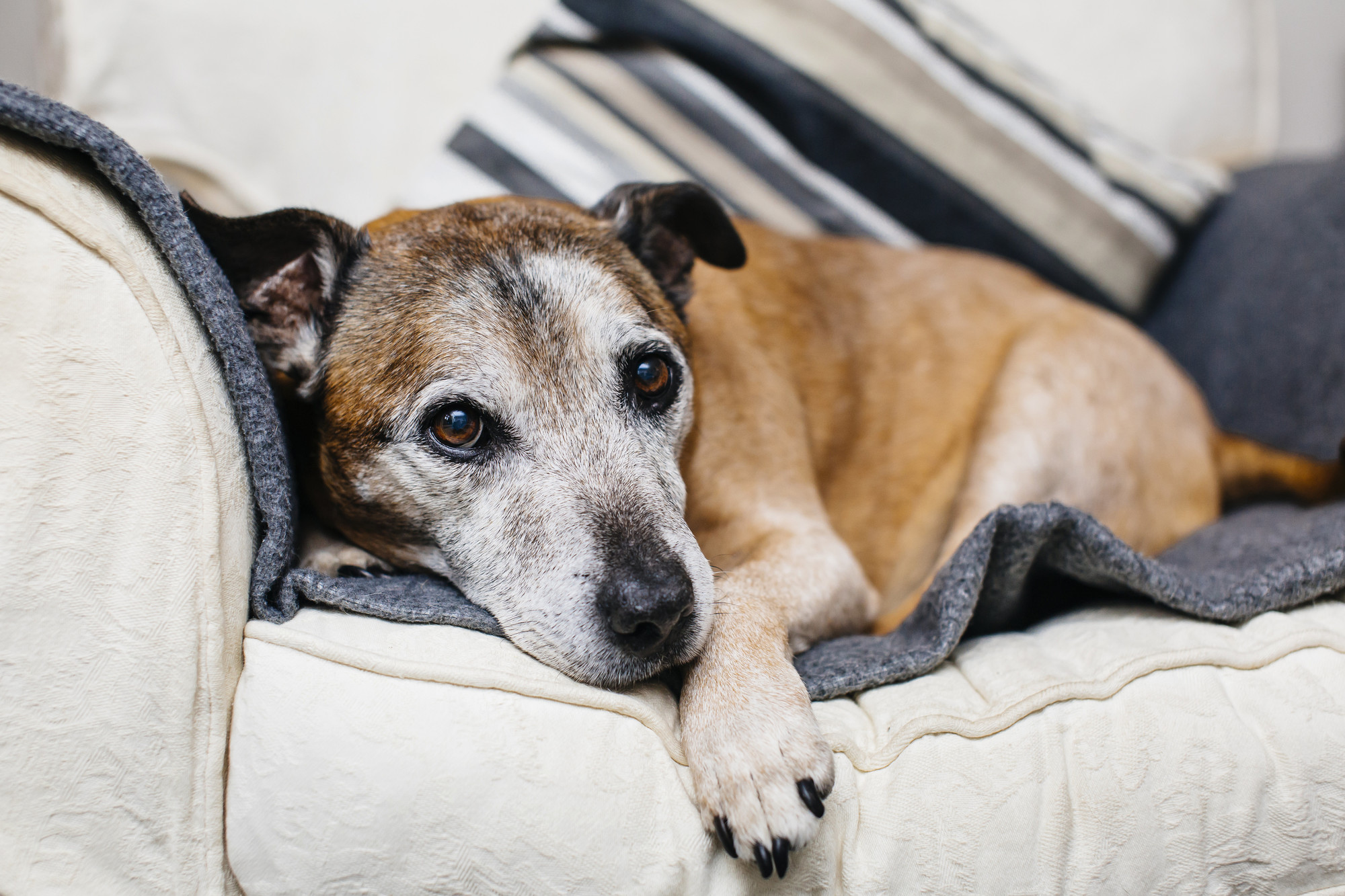
Why do dogs cough?
Just like us, dogs will cough when they have a tickle in their throat, but sometimes it can be more serious.
Why is my dog coughing?
There are a variety of reasons your dog may be coughing, from pulling on the lead to kennel cough.
Important
Contact your vet immediately if your dog is struggling to breathe, or if you think they have something stuck in their throat.
These are some of the most common reasons your dog may have a cough:
Pulling on the lead
Coughing is common when a dog is pulling on their lead and the collar is putting pressure on their windpipe.
Using a harness instead of a collar can help to reduce coughing and prevent any damage to your dog's neck or windpipe. You can also consider doing some lead training to stop your dog from pulling on the lead.
Kennel cough
Kennel cough is a respiratory infection that often causes a hacking cough. While it's very contagious, it is not usually dangerous. As long as your dog is acting like their usual self, they will normally recover within two to three weeks. During this time, you should keep them away from other dogs to reduce the chance of it spreading.
If your dog has kennel cough and seems unwell or their kennel cough persists, take them to the vet for a check-up. There are vaccines available for kennel cough, so talk to your vet about which vaccines are best for your dog.
Tracheal collapse
Tracheal collapse is a condition that causes your dog's windpipe to collapse, making them cough.
It causes a dry, honking cough that comes in bouts. These bouts are often triggered by excitement, anxiety, exercise and hot weather, and the coughing will usually stop quickly once your dog has settled down. Tracheal collapse can also cause wheezing, and, in severe cases, difficulty breathing. It's most commonly seen in small breeds such as Yorkshire terriers and Chihuahuas.
If you think your dog may be suffering with tracheal collapse, contact your vet for advice. They may offer medication to manage your dog's coughing, or in severe circumstances, surgery may be required. If your dog is struggling to breathe, contact your vet immediately.
Bronchitis
Bronchitis occurs when your dog's airways become inflamed. This causes mucus to form in your dog's airways, making your dog cough. Common symptoms of bronchitis include:
- coughing up mucus
- wheezing
- loss of appetite
- lack of energy
This can be triggered by number of things, including bacterial and viral infections, or allergies. Bronchitis can also be caused by irritants in the air including dust, cigarette smoke, household aerosols and mould.
Chronic bronchitis is a long term, irreversible condition. Often the exact trigger cannot be found, but it can be managed with anti-inflammatory medication to help reduce the swelling in your dog's airway. If your dog's airways are inflected, they may also need antibiotics.
If you think your dog has bronchitis, speak to your vet for advice.
Foreign objects stuck in their throat
If your dog is struggling to breathe in between coughing bouts or cannot seem to swallow, they could have something lodged in their throat, such as a piece of toy, food or stick.
If you think your dog has something stuck in their throat, contact your vet immediately. It's an emergency if your dog is struggling to breathe.
Signs that your dog has something in their throat include:
- pawing at their mouth
- gagging or retching
- gulping or trying to swallow repeatedly
- drooling
- collapse
- blue lips or gums
Important
While first aid can be performed if your dog is choking, this should not delay getting your dog to the vets. Getting your dog seen quickly is crucial to giving them the best chance of recovery.
Heart disease
One of the most common symptoms of heart disease in dogs is a persistent cough and difficulty breathing. Heart disease can cause your dog's heart to enlarge, which can irritate their windpipe and make your dog cough. It can also cause fluid to build up on your dog's chest.
If your dog has heart disease, they may show other symptoms such as:
- a cough that worsens at night or when lying down
- difficulty exercising
- low energy or tiredness
- difficulty breathing
- weakness
- weight loss
Some dogs are born with heart disease, while others can develop the condition later in life. Dogs with heart disease can also develop heart failure. This can cause difficulty breathing, a bloated abdomen (tummy) and collapse.
If you think your dog might be having trouble with their heart, contact your vet as soon as possible. Your vet will be able to test your dog for the condition, and help you to manage it through treatments or medication.
Lungworm
Lungworm is an illness that can be caught if your dog eats infected snails, slugs or frogs. It can also be caught if your dog comes into contact with anything that has their slime on it, such as grass or toys that are left outside.
Lungworm can cause a variety of symptoms, including coughing. Other symptoms include:
- loss of appetite
- vomiting or diarrhoea
- weight loss
- difficulty breathing
Regular worming treatment is the best way to prevent lungworm. Talk to your vet about the best worming treatment for your dog.
Lung cancer
Lung cancer is a rare type of cancer in dogs. It causes tumours to grow in your dog's lungs, which can affect your dog's breathing and cause them to cough. Lung cancer can affect dogs at any age, but it's most common in older dogs. Cancer can also spread into the lungs from other parts of the body.
Symptoms include:
- difficultly breathing
- coughing up blood
- weight loss
- difficultly exercising
- low energy
- fast breathing
- wheezing
By the time your dog shows symptoms, the cancer has usually progressed. As there are many different stages to the condition, treatment can vary depending on which organs of the body are affected.
If you suspect cancer in your dog, or if your dog's cough persists, always contact your vet for advice.
BOAS (brachycephalic obstructive airway syndrome)
BOAS or brachycephalic obstructive airway syndrome, is a condition that affects brachycephalic (flat faced) breeds of dogs.
Brachycephalic dog breeds such as pugs, French bulldogs, Boston terriers and English bulldogs, have short noses, making it difficult for them to breathe. As a result, they can suffer with the following symptoms:
- noisy breathing
- coughing
- gagging or vomiting
- snoring
- difficultly exercising
- collapsing after exercise
- excessive panting
- sensitive to hot weather
If you think your dog is suffering with BOAS, contact your vet for advice. Your vet will be able to help you to manage your dog's condition.
In severe cases, surgery may be needed to provide better airflow through your dog's nostrils.
When should I seek vet help for my dog's cough?
Some causes of coughing are more serious than others. You should always seek veterinary attention when:
- the cough does not go away, gets worse over time or is continuous
- your dog has lost their appetite or seems unwell
- your dog coughs up blood
- your dog has breathing difficulties or a faster breathing rate
Page details
Reviewed
• 7 December 2023
Next review
• 7 December 2026






